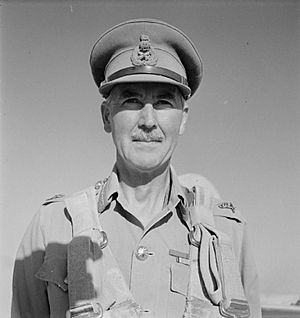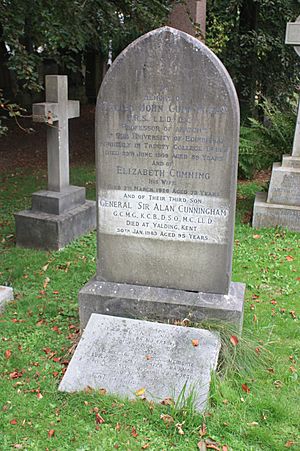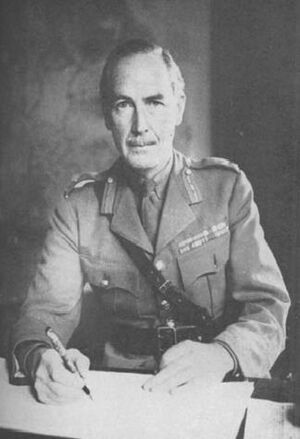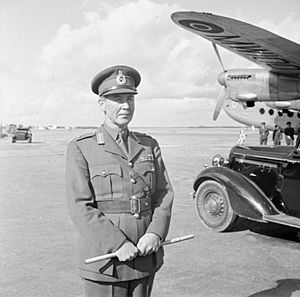Alan Cunningham facts for kids
Quick facts for kids
Sir Alan Cunningham
|
|
|---|---|
 |
|
| Born | 1 May 1887 Dublin, Ireland |
| Died | 30 January 1983 (aged 95) Tunbridge Wells, Kent, England |
| Buried |
Dean Cemetery, Edinburgh, Scotland
|
| Allegiance | United Kingdom |
| Service/ |
British Army |
| Years of service | 1906–1946 |
| Rank | General |
| Service number | 74 |
| Unit | Royal Artillery |
| Commands held | Eastern Command Northern Ireland Staff College, Camberley Eighth Army East Africa Force 51st (Highland) Infantry Division 9th (Highland) Infantry Division 66th Infantry Division 5th Anti-Aircraft Division |
| Battles/wars | First World War Second World War Palestine Emergency |
| Awards | Knight Grand Cross of the Order of St Michael and St George Knight Commander of the Order of the Bath Distinguished Service Order Military Cross Mentioned in despatches (4) |
| Relations | Andrew Cunningham, 1st Viscount Cunningham of Hyndhope (brother) |
| Other work | High Commissioner of Palestine (1945–48) Colonel Commandant of the Royal Artillery |
General Sir Alan Gordon Cunningham (born May 1, 1887 – died January 30, 1983) was an important officer in the British Army. He is well-known for his successes against Italian forces in East Africa during the Second World War. He also led the Eighth Army in the desert, but his command ended during a battle called Crusader. Later, he served as the last High Commissioner of Palestine. He was the younger brother of Lord Cunningham of Hyndhope, a famous admiral.
Contents
Early Life and Military Career
Alan Cunningham was born in Dublin, Ireland. He was the third son of Professor Daniel John Cunningham and Elizabeth Cumming Browne. He went to Cheltenham College and the Royal Military Academy, Woolwich. In 1906, he joined the Royal Artillery as an officer.
During the First World War, he served with the Royal Horse Artillery. He earned the Military Cross in 1915 and the Distinguished Service Order in 1918 for his bravery. After the war, he worked as a staff officer in the Straits Settlements for two years.
After studying at the Royal Naval College, Greenwich in 1925 and the Imperial Defence Studies in 1937, Cunningham became the Commander of the Royal Artillery for the 1st Infantry Division. In 1938, he was promoted to major-general. He then became the commander of the 5th Anti-Aircraft Division.
Second World War Service
When the Second World War began, Cunningham held several short commands of infantry divisions in the United Kingdom. These included the 66th Infantry Division, the 9th (Highland) Infantry Division, and later the 51st (Highland) Infantry Division. He was then promoted to lieutenant-general and took charge of the East Africa Force in Kenya.
East African Campaign Victories
During the East African Campaign, General Sir Archibald Wavell ordered Cunningham to recapture British Somaliland. He also had to free Addis Ababa, Ethiopia, from the Italians. Meanwhile, other British forces attacked from Sudan in the north.
Cunningham's attack began by taking the ports of Kismayu and Mogadishu on the Indian Ocean. The Italians had moved further inland in Somalia. On April 6, 1941, Cunningham's forces successfully entered Addis Ababa. On May 11, his northern units met up with other British forces. Together, they surrounded Amba Alagi. On May 20, the Italian army, led by Amedeo di Savoia, surrendered at Amba Alagi.
Commanding the Eighth Army
Because of his success in East Africa, Cunningham was chosen to lead the new Eighth Army in North Africa in August 1941. His first big job was to lead an attack in the Libyan Desert called Crusader, which started on November 18. However, his army faced early difficulties and losses. Cunningham suggested stopping the attack, but his commanders disagreed. As a result, he was removed from his command.
He returned to Britain and spent the rest of the war in other important roles. He was the Commandant of the Staff College, Camberley (1942). He also served as the General Officer C-in-C in Northern Ireland (1943) and Eastern Command (1944). He received the honor of Knight Commander of the Order of the Bath in 1941.
Post-War Role

After the war, Cunningham was promoted to general on October 30, 1945. He returned to the Middle East as the High Commissioner of Palestine. He held this important position from 1945 to 1948.
His job was to manage the region during a very challenging time. Different groups in Palestine were in conflict, and Arab armies were preparing to enter the area once the British left. Cunningham retired from the army in October 1946. However, he continued as High Commissioner until 1948. A famous historical photo shows Cunningham taking down the British flag at the port of Haifa. This picture is often seen in Israeli history books.
Cunningham also served as the Colonel Commandant of the Royal Artillery until 1954. He passed away in Royal Tunbridge Wells, Kent, England. He is buried with his parents in Dean Cemetery in Edinburgh.
Orders and Decorations
- Knight Grand Cross of the Order of St Michael and St George (1948)
- Knight Commander of the Order of the Bath (1941)
- Distinguished Service Order (1918)
- Military Cross (1915)
- 1914 Star with Clasp
- Mentioned in Despatches (four times)
- British War Medal
- Victory Medal
- Order of the Brilliant Star of Zanzibar, 1st class (1941)
- Commander of the Legion of Merit (United States, 1945)
- Order of the Crown, 1st class (Belgium, 1950)
- Order of Menelik II, 1st class (Ethiopia, 1954)
 | Roy Wilkins |
 | John Lewis |
 | Linda Carol Brown |



